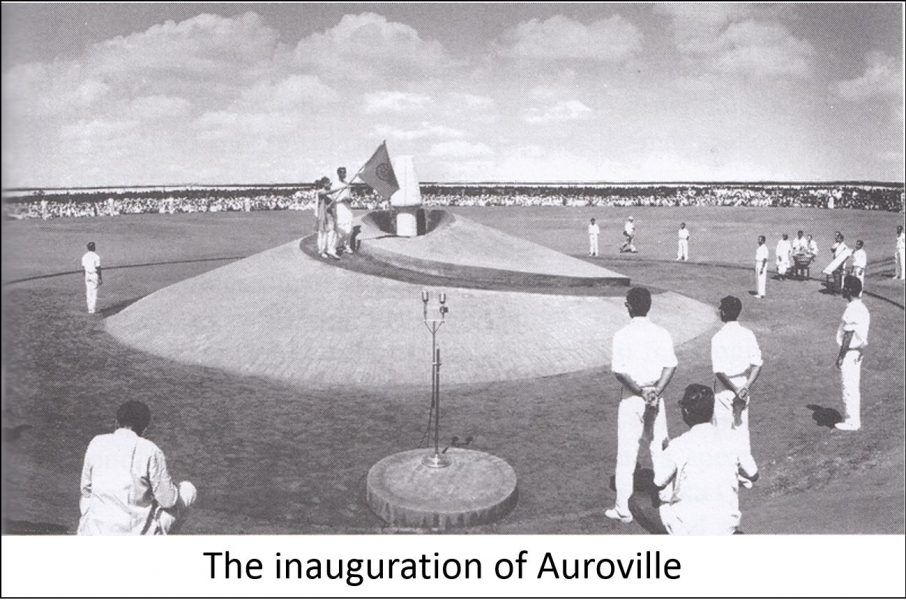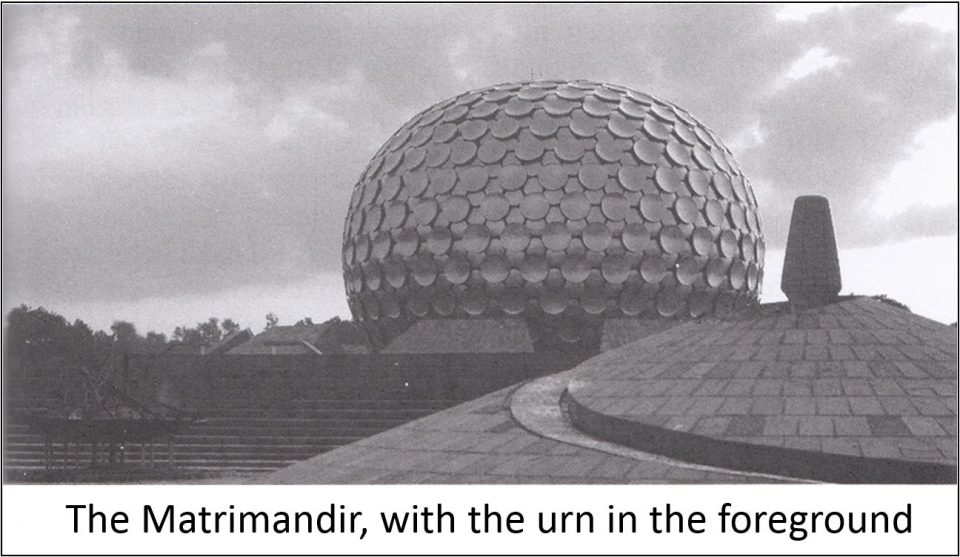The year 1965 had at first started with a drawback for the Mother’s cause. In the night of 11 February a powerful attack by rowdy elements of Pondicherry took place on many Ashram buildings and there was considerable damage. The original cause was an anti-Hindi-agitation in Madras state, the protest of South Indian Tamils against the imposition of Hindi (which is mainly spoken in the North) as the national language of India. The agitation then spread to the neighbouring Pondicherry, and the Ashram which is no party to the idea of Hindi being imposed, became quite illogically its victim.
Undaunted by this event, the Mother decided to realise further an old ‘dream’ of hers to create a place where seekers from all over the world could live a progressive life in the service of Truth on a city level. The Ashram itself had been her first experiment on a limited scale. Now she launched another on a more generalised basis. The name ‘Auroville’ derives from the French ‘Aurore’, meaning ‘dawn’, and ‘Auroville’ signifies ‘City of Dawn’. On 8 September the Mother declared: “Auroville wants to be a universal town where men and women of all countries are able to live in peace and progressive harmony, above all creeds, all politics and all nationalities.
“The purpose of Auroville is to realise human unity.”[1]
Auroville was to come up in the vicinity of Pondicherry on an area of 15 square miles and it was planned for a population of 50,000. Four zones or sectors – Residential, Industrial, Cultural, International – were to be arranged around the Matrimandir, the ‘Temple of the Mother’.
The physical decision to launch Auroville was taken at the  end of 1964 during the World Conference of Sri Aurobindo Society, an international organization which the Mother had started in 1960 and of which she was the president. Roger Anger, a prominent French architect, began designing plans for the city, while Navajata as General Secretary of Sri Aurobindo Society managed the project in general under the Mother’s supervision as well as informed the public about it and arranged for financial support.
end of 1964 during the World Conference of Sri Aurobindo Society, an international organization which the Mother had started in 1960 and of which she was the president. Roger Anger, a prominent French architect, began designing plans for the city, while Navajata as General Secretary of Sri Aurobindo Society managed the project in general under the Mother’s supervision as well as informed the public about it and arranged for financial support.
The inauguration of Auroville was on 28 February 1968. At 10.30 a.m. the Mother read out a message from her room to those participating in the event:
“Greetings from Auroville to all men of goodwill. Are invited to Auroville all those who thirst for progress and aspire to a higher and truer life.”[2]
Children from almost all countries of the world placed a handful of earth from their native lands into a specially prepared urn, which was then sealed by Nolini Kanta Gupta. 124 nations and 23 Indian States were represented at the inauguration.

The Mother said in the first article of the Auroville charter, which was read out in sixteen languages:
“Auroville belongs to nobody in particular. Auroville belongs to humanity as a whole. But to live in Auroville one must be the willing servitor of the divine Consciousness.”[3]
The Mother clarified that the Ashram would keep its role as pioneer and inspiring and guiding force, while Auroville would be the attempt of a collective realisation. What was expected from the Aurovillians was “the simple good will to make a collective experiment for the progress of humanity.”[4] It was a city for the new man, a model for the future of the world.
By the middle of 1967 a pioneer colony named ‘Promesse’ had already been formed at the border of Auroville, and settlements like ‘Auro-Beach’, ‘Hope’ and ‘Aspiration’ soon followed after the foundation ceremony. In 1971 the foundation was laid for the Matrimandir, ‘the Soul of Auroville’ in the form of a spherical globe (slightly flattened on top and on the bottom), constructed on the scaffold of four pillars which represent the four powers of the Mother. Inside the globe a meditation hall was to be built, a spiritual-dynamic power centre. The Mother had said in November 1970 on the Matrimandir: “Matrimandir will be the soul of Auroville. The sooner the soul is there, the better it will be for everybody, and especially for Aurovillians.”[5]
Soon it became evident that the demands made on the first pioneers of the City of Dawn were considerable. There was the hot humid climate, the absence of water and electricity, the arid earth, limited financial and technical means as well as psychological difficulties which (in the case of Western Aurovillians) resulted from the sudden transition from a highly developed civilization to a kind of rural wilderness where suddenly every bucket full of water, every nail and screw became desired objects which one could never be sure of. Moreover, everybody had imported all his own ideas and concepts, and these were not always identical with those of other pioneers.
The Mother gave general guide-lines for the development of the City and also regulated many details, but at the same time she expected from the Aurovillians that they should open to the higher consciousness and receive directly the answer for all those never-ending problems.
It was and is a very difficult project which made some considerable progress in the beginning but was overwhelmed by ever-growing difficulties after the Mother’s departure. It is at this moment hardly possible to assess more recent developments, but we may say that the true collective Spirit of the City of Dawn is yet to be discovered, even though we have to appreciate the enormous efforts and contributions of some pioneers, especially if we see the difficult conditions of the terrain and know what demands it makes on the residents, physically and psychologically.
The Mother had an experience in May 1969 in which she showed Sri Aurobindo in the subtle-physical how Auroville would be and should be eventually. Even details such as kitchen and food were noted. This means, in other words, that the City is already formed somewhere, completely designed in its ideal shape, and the only question that remains open now is: when will it be fully manifest?
[1] K. R. S. Iyengar’s On the Mother 2:713
[2] K. R. S. Iyengar’s On the Mother 2:745
[3] K. R. S. Iyengar’s On the Mother 2:746
[4] K. R. S. Iyengar’s On the Mother 2:753
[5] K. R. S. Iyengar’s On the Mother 2:775



